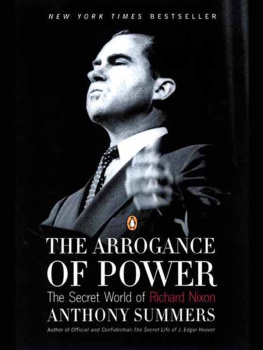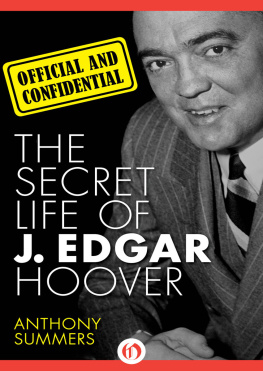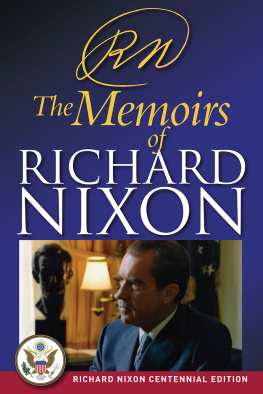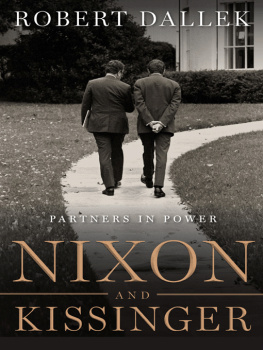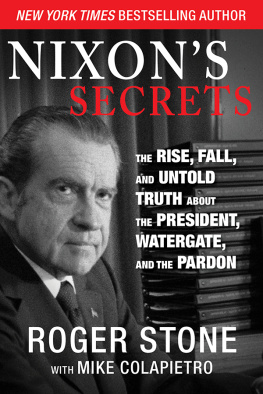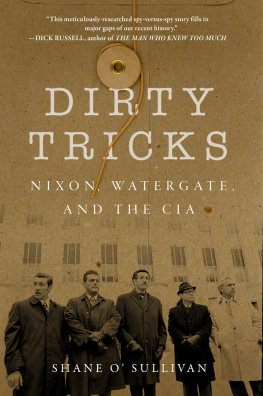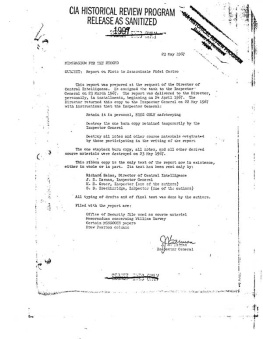PENGUIN BOOKS
Published by the Penguin Group
Penguin Putnam Inc., 375 Hudson Street,
New York, New York 10014, U.S.A.
Penguin Books Ltd, 27 Wrights Lane,
London W8 5TZ, England
Penguin Books Australia Ltd, Ringwood,
Victoria, Australia
Penguin Books Canada Ltd, 10 Alcorn Avenue
Toronto, Ontario, Canada M4V 3B2
Penguin Books (N.Z.) Ltd, 182190 Wairau Road,
Auckland 10, New Zealand
Penguin Books Ltd, Registered Offices: Harmondsworth, Middlesex, England
First published in the United States of America by Viking Penguin, a member of Penguin Putnam Inc., 2000
Published in Penguin Books 2001
13579108642
Copyright Anthony Summers, 2000 All rights reserved
THE LIBRARY OF CONGRESS HAS CATALOGED
THE HARDCOVER EDITION AS FOLLOWS:
Summers, Anthony.
Arrogance of power : the secret world of Richard Nixon /
Anthony Summers.
p. cm.
1. Nixon, Richard M. (Richard Milhous), 1913Psychology.
2. PresidentsUnited StatesBiography. I. Title.
E856 .S86 2000
973.924'092dc21 00060012
Printed in the United States of America
Set in Sabon
Designed by Jaye Zimet
Except in the United States of America, this book is sold subject to the condition that it shall not, by way of trade or otherwise, be lent, resold, hired out, or otherwise circulated without the publishers prior consent in any form of binding or cover other than that in which it is published and without a similar condition including this condition being imposed on the subsequent purchaser.
ISBN: 978-1-1011-9948-0
For Colm, Fionn, and Lara
T en years ago, during a late-night conversation about investigative writing, Norman Mailer suggested I take on the story of Richard Nixon and Watergate. I barely gave it a thought until Nixon died in 1994. It struck me then that, even allowing for respect for the dead, most public commentary seemed excessively deferential to the memory of the first American president to have resigned in disgrace. Something did not connect. Who was this man in whom so many millions of Americans had placed their trust, who had broken that trust, yet who had achieved political resurrection time and again? One who knew him better than most, John Ehrlichman, said in an interviewwith Mailer as it happenedthat a Nixon biography was the toughest writing assignment he could imagine. Later, Ehrlichman told me he hoped for a more solid history of that time, a history that would help our children to comprehend and move forward. The presidents former aide was right about the difficulties of the assignment, for the main protagonist was elusive, the evidence scatteredsometimes buried deep. In this book I have reached for the reality of Nixon, from birth in obscurity in California to the fall from the ultimate power of the presidencyfor something approaching that more solid history.
A.S.
When Nixon died I thought of the Shakespeare quote about the evil that men do living after them, and the good being interred with their bones. With Nixon the reverse was happening: They wanted the good to live on and the evil to be buried.
John Rothmann, longtime supporter, 1996
A pril 1994. On a hillside in Southern California two men, one much older than the other, checked their watches and stepped out of shelter into the rain. They had been waiting for nearly an hour. Then, as a convoy of limousines slid funereally slowly into view, a thunderclap split the clouds.
Thats the Lord, welcoming the President to His house of many mansions, said the elderly man.
You know what it sounds like to me? responded his companion. I think its the Old Man saying, Lord, Im here now if you need any help.
This was a rare moment of levity on a day of intense emotions and searing memories. Billy Graham, evangelist and friend to a string of presidents, and veteran Republican advance man Ron Walker had come to California to bury the thirty-seventh president of the United States, Richard Milhous Nixon.
The dominant American politician of the second half of the twentieth century had been felled the previous week by a massive stroke, at the age of eighty-one. He had spent his last active day working on a political speech at his home near New York City. Nixon had left instructions that should catastrophic illness leave him totally incapacitated, he did not wish to be kept alive by artificial means. At the hospital the chief of neurology said Nixon had not wanted to go on living if he could not contribute, could not lead. He had taken his last chance to exercise moral leadership.
As president, two decades earlier, Nixon had specified that upon his death he wished to lie in state beneath the dome of the Capitol, as had national leaders since Abraham Lincoln. The man he had served as vice president, Dwight D. Eisenhower, his predecessor Lyndon B. Johnson, and his old rival John F. Kennedy, had all lain in state there. In old age, though, Nixon preemptively ensured that no one would be able to deny him the honor. He had ordered that his remains were instead to be flown directly to Yorba Linda, near Los Angeles, and plantedhis wry wordbeside his wife, Pat, in the shadow of the frame house where he had spent his childhood.
The air force brought Richard Nixon home in a simple mahogany coffin draped with American flags, aboard the same blue and white Boeing 707once designated Air Force Onethat had carried him to California in 1974, when he became the first U.S. president ever to resign in disgrace.
Americas response to Nixons dying would probably have surprised him. President Clinton, a Democrat, who as a young man had opposed Nixon and demanded that he resign over Watergate, declared a day of national mourning, closing Congress, the Supreme Court, and the New York Stock Exchange and suspending mail deliveries. Flags were to fly at half-mast at home, and at U.S. installations around the world, for a month. The funeral party left the East Coast to a twenty-one-gun salute and was met at the dead mans birthplace by thousands of people lining the streets. Citizens huddled under umbrellas, clutching wilted bouquets and American flags, in a freak storm that for the New York Times reporter covering the ceremony evoked the tempest scene in King Lear.
That afternoon and into the night an honor guard stood sentry as citizens filed into the lobby of the Nixon Library, past photographs of the president in his glory moments. They saluted, doffed hats, or stood hand on heart before the closed coffin. The line was three miles long at one point, and by the time the doors were closed forty-two thousand people were estimated to have paid homage.
President Clinton, flanked by all four surviving U.S. presidentsFord, Carter, Reagan, and Bushbade farewell at the funeral on behalf of a grateful nation. May the day of judging President Nixon on anything less than his entire life and career, he urged, come to a close. Gerald Ford, who had replaced him after the resignation, that week declared himself more convinced than ever that he had been right to grant Nixon a blanket pardon for crimes he may have committed during the presidency.
Amid the mourners that day stood a phalanx of former secretaries of state, secretaries of defense, an attorney general, members of Congress, and representatives from eighty-five foreign countries. The governor of California, Pete Wilson, and Senate Minority Leader Bob Dole wept during their eulogies. The guttural voice of Henry Kissinger, former secretary of state and national security adviser, cracked when he praised Nixon as our gallant friend... one of the seminal presidents in the conduct of foreign policy, whose greatest accomplishment was as much moral as it was political.
The funeral closed with full military honors. Air force fighters flew overhead in the missing man formation, howitzers boomed and rifles cracked, and a lone bugler sounded taps.

